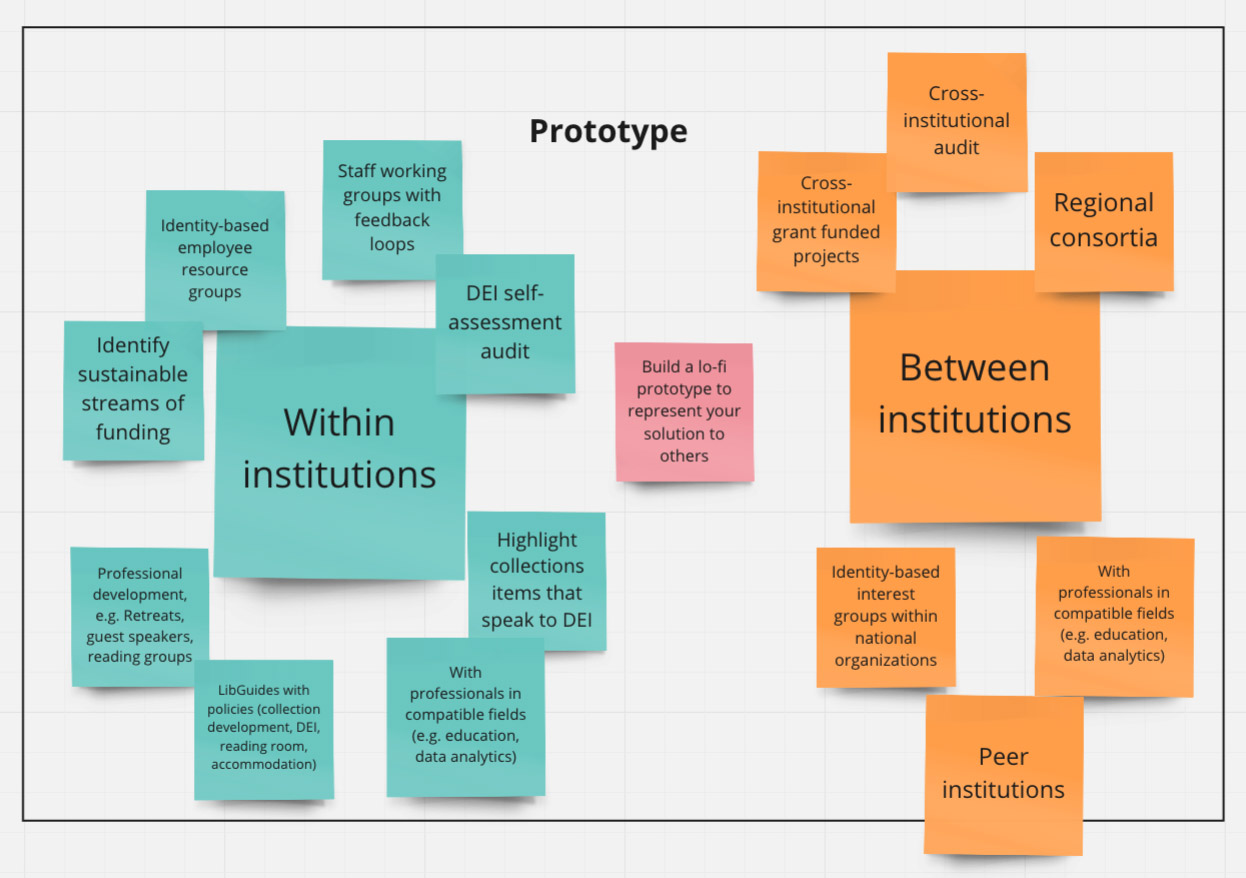Empowering Diversity in Libraries: A Collaborative Blueprint for Change
An Innovative Approach to Enhancing Diversity and Inclusion within Library Workforces
Team Six addressed a crucial challenge within the library community: fostering an inclusive environment that actively supports and increases full-time, permanent positions for underrepresented staff. Their solution emphasizes the power of collaboration both within and between institutions to create a workforce where diversity is not just welcomed but empowered.
The team’s updated problem statement focused on devising strategies to assist library recruiters and staff in transforming the library workforce to be more inclusive of underrepresented groups, thereby fostering a sense of empowerment among these staff members. Recognizing the complexities of this challenge, Team Six presented a prototype that utilizes collaboration as a key mechanism for achieving these goals.
How might we help library recruiters and staff transform the workforce to support an increase in full time, permanent underrepresented staff that feel empowered in the workplace.
Within Institutions: The team proposed the creation of identity-based employee resource groups and staff working groups with feedback loops. These initiatives aim to provide safe spaces for underrepresented staff to share their experiences and contribute to creating a culture of care and inclusiveness within the library. Additionally, the introduction of a DEI (Diversity, Equity, and Inclusion) self-assessment audit, as practiced by Millie’s institution, offers a structured approach for libraries to evaluate and improve their DEI efforts.
To ensure these initiatives are sustainable, Team Six underscored the importance of identifying long-term funding sources. This is particularly crucial for transitioning short-term or unpaid roles into full-time, permanent positions that are attractive to BIPOC (Black, Indigenous, and People of Color) staff, thereby promoting a more diverse library workforce.
Between Institutions: Expanding on the concept of collaboration, Team Six suggested leveraging identity-based interest groups within national organizations and engaging with professionals in compatible fields outside their own institutions. This broader network of collaboration could facilitate the sharing of resources, ideas, and best practices, thereby enhancing the collective capability of libraries to support diversity and inclusion. Additionally, the team advocated for cross-institutional audits and grant-funded projects as means to share resources and expertise on a larger scale.

Team Six’s presentation highlighted the essential role of collaboration in driving meaningful change within the library workforce. By encouraging both internal and external partnerships, libraries can create more inclusive environments that not only attract but also empower underrepresented staff. This approach not only benefits individual institutions but also strengthens the library profession as a whole, making it more reflective of the diverse communities it serves.
In summary, this proposes a collaborative, thoughtful, and actionable blueprint to tackle one of the library sector’s most pressing challenges. Their approach serves as a testament to the power of collective effort in fostering a more diverse, inclusive, and empowered library workforce.
Team 6 Members
Thanks to these project team members for their collaboration with DATALIS and their contributions towards innovating professional development.
- Synatra Smith
- Millie Fullmer
- Stephanie Kern
Evaluate This Project
Please review the story and answer the five questions based on your knowledge, experience, and perspective. Your feedback will help us to innovate professional education that impacts recruitment, growth, and retention.
Implementation Roadmap
Phase 1: Internal Initiatives
- Establish Identity-Based Employee Resource Groups (ERGs)
- Action: Create ERGs to provide safe spaces for underrepresented staff to share experiences and offer mutual support.
- Steps:
- Survey staff to identify interest in various identity-based groups.
- Appoint facilitators and define the mission and goals for each ERG.
- Schedule regular meetings and allocate resources to support ERG activities.
- Form Staff Working Groups with Feedback Loops
- Action: Develop working groups focused on diversity, equity, and inclusion (DEI) initiatives, ensuring continuous feedback mechanisms.
- Steps:
- Identify key areas needing attention through staff consultations.
- Establish working groups with diverse representation.
- Implement regular feedback sessions to assess progress and gather input.
- Conduct DEI Self-Assessment Audits
- Action: Implement structured audits to evaluate current DEI efforts and identify areas for improvement.
- Steps:
- Select or develop a DEI audit tool suitable for the institution.
- Engage all staff levels in the assessment process.
- Analyze results and develop action plans to address identified gaps.
- Secure Long-Term Funding for Positions
- Action: Identify and secure funding to transition short-term or unpaid roles into full-time, permanent positions attractive to underrepresented groups.
- Steps:
- Assess current staffing and identify roles suitable for transition.
- Explore internal budget reallocations and external funding opportunities, such as grants.
- Develop proposals and business cases to secure necessary funding.
Phase 2: External Collaborations
- Engage with Identity-Based Interest Groups in National Organizations
- Action: Collaborate with national organizations’ interest groups to share resources and best practices.
- Steps:
- Identify relevant national organizations and their interest groups.
- Establish communication channels and participate in joint initiatives.
- Share experiences and resources to promote DEI across institutions.
- Collaborate with Professionals in Compatible Fields
- Action: Engage with professionals outside the library sector to gain diverse perspectives and strategies.
- Steps:
- Identify fields with compatible DEI goals and challenges.
- Initiate cross-sector dialogues and partnerships.
- Implement joint projects or workshops to exchange knowledge.
- Conduct Cross-Institutional Audits and Pursue Grant-Funded Projects
- Action: Partner with other institutions for DEI audits and collaborative projects funded by grants.
- Steps:
- Identify potential partner institutions committed to DEI.
- Design and conduct joint audits to assess collective DEI efforts.
- Apply for grants to fund collaborative DEI initiatives.
Phase 3: Evaluation and Continuous Improvement
- Monitor and Evaluate Initiatives
- Action: Regularly assess the effectiveness of both internal and external initiatives.
- Steps:
- Develop metrics to measure progress in DEI efforts.
- Collect data through surveys, feedback sessions, and performance indicators.
- Analyze data to identify successes and areas needing improvement.
- Foster a Culture of Continuous Improvement
- Action: Encourage ongoing learning and adaptation to enhance DEI efforts.
- Steps:
- Provide training and development opportunities focused on DEI.
- Celebrate achievements and recognize contributions to DEI initiatives.
- Update policies and practices based on evaluation findings and emerging best practices.
Summary
To implement Team 6’s collaborative blueprint for enhancing diversity and inclusion in library workforces, institutions should initiate internal efforts such as establishing identity-based employee resource groups, forming DEI-focused working groups with feedback mechanisms, conducting self-assessment audits, and securing long-term funding to convert temporary roles into permanent positions. Externally, libraries are encouraged to collaborate with national organizations’ interest groups, engage with professionals in related fields, and undertake cross-institutional audits and grant-funded projects. Continuous monitoring and fostering a culture of improvement are essential to ensure the sustainability and effectiveness of these initiatives.
